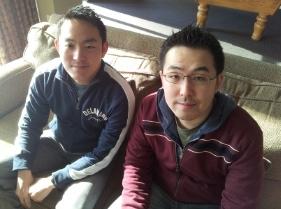A new organization that plans to focus broadly on health issues for Asians expects approval for incorporation this month, a year after the demise of an Asian HIV/AIDS group, co-founders tell Xtra.
The group, to be called Asian Wellness Services, will cater to Asians with “culturally stigmatized health issues,” particularly sexual issues, mental health issues, addiction and disability, focusing broadly because all health issues are interconnected, says Shimpei Chihara, one of the co-founders.
Founders of the group met on Feb 20 with several dozen people at the Roundhouse Community Centre to discuss the proposed organization. Four days later, the founders applied to incorporate the non-profit group.
The founders want to fill the gap left by the demise of the Asian Society for the Intervention of AIDS (ASIA) and offer even more services.
ASIA lost its charitable status and most of its government funding a year ago, closing its doors after 16 years of service. The group educated Asians about HIV/AIDS through a phone line, educational programs and street outreach, providing services in Cantonese, Mandarin, Korean, Japanese and English.
“After ASIA, there have been no sexual health services targeting the Asian population, except a small portion of AIDS Vancouver,” Chihara says.
Go Yanagisawa, another co-founder of the group who had volunteered for ASIA for several years, says, “We thought we would start an organization that supports the Asian population, specifically the marginalized Asian population.”
Most of the founders of the new group were staffers or volunteers with ASIA. But, Chihara says, “this is not a revival of ASIA at all. On the other hand, we learned a lot from ASIA from the good aspects and negative aspects.”
Several of the founders are social workers. Some are involved in mental health and found common ground with those dealing with sexual health, as the two issues are interrelated, Chihara says.
“Quite a few people in the Asian communities are double- or triple-marginalized, mainly because they don’t have enough support services or they are kind of isolated within the communities because maybe they’re sexual minorities or they’re struggling with stigmatized health issues, mental health or sexual health or disability,” he says.
Like ASIA, Asian Wellness Services will seek to help people in their native languages. In his work as a social worker, Chihara is organizing a workshop for Japanese people struggling with depression, and he has found they are “having a difficult time to access services because they need to speak in Japanese even though they’ve been here for 30 or 40 years.”
The organization will not be limited to HIV/AIDS, to avoid the stigma, Chihara says. Even among those with HIV, most don’t develop AIDS, so they don’t want to associate with an AIDS organization, he says.
ASIA “was a good HIV/AIDS community-based organization, but it wasn’t necessarily a good organization in terms of being accepted or supported within Asian communities,” Chihara says. “Our organization would like to make it more approachable for Asian community members.”
Chihara says the new group’s name “doesn’t have any stigma attached to it.”
Brian Chittock, executive director of AIDS Vancouver, says a group with a broader mission could be an innovative way to dodge the stigma of AIDS.
“The stigma is a huge issue,” he says. “We’re always running into it. Next year, we’re going to be around 30 years and we’re still dealing with this. It’s just incredible.”
Chihara and Yanagisawa expect to launch the group in April.
“From now on our goal is to get funding to get started and to get the programs going,” Yanagisawa said. The group will seek money from foundations, raise money from events and collaborate with other organizations.
Chihara says working with other groups will be essential.
“We’re thinking of collaboration as our primary tactic because asking for money from the government, for example, is going to be a very competitive environment right now,” he says. “For now, we need to work with established organizations. Maybe we can help them help us meet the needs of our clients.”
One starting point could be AIDS Vancouver, which took over ASIA’s intravenous drug user program that had ASIA’s only remaining funding from Vancouver Coastal Health.
Chittock says his group hopes it could one day turn over the program to another organization. But AIDS Vancouver would want to hand the program over to Asian Wellness Services only after ensuring the new organization is successful.
AIDS Vancouver’s research also could prove valuable. The group recently received money from the Public Health Agency of Canada to examine what various Asian communities need for HIV awareness and prevention. Chittock said AIDS Vancouver would share its findings with other community groups, which could use the results to try to find funding.
“We’d definitely be happy to cooperate with AIDS Vancouver,” Chihara says.

 Why you can trust Xtra
Why you can trust Xtra